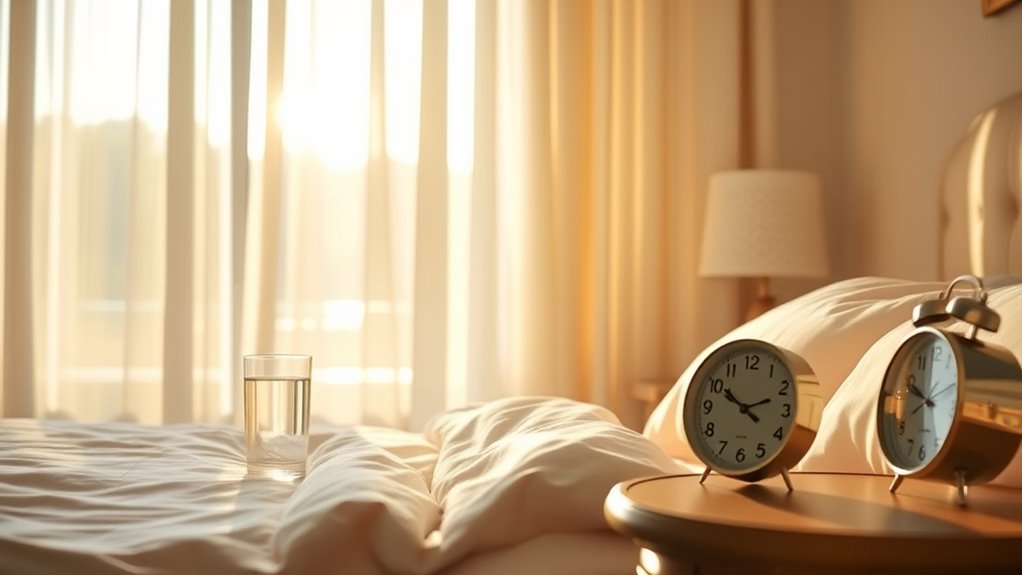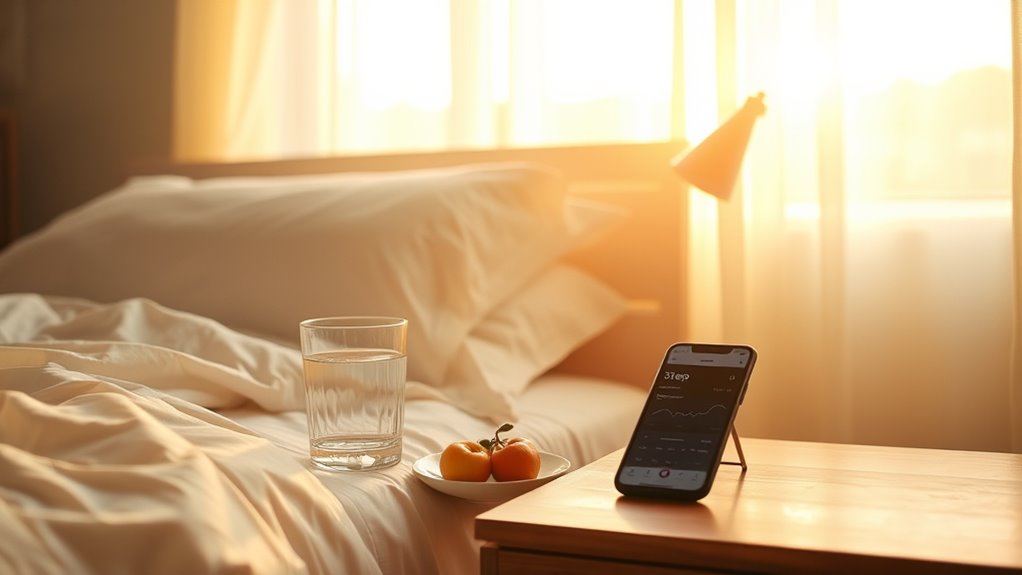Your body’s circadian rhythm is a natural internal clock that manages your sleep-wake cycle, responding to light, food, and timing cues. Exposure to light in the day helps you stay alert by suppressing melatonin, while darkness allows sleep signals to activate. Eating at consistent times supports your rhythm, too. Keeping a regular schedule and managing light exposure can improve your sleep and overall well-being. Continuing to explore these connections reveals how lifestyle choices influence your biological clock.
Key Takeaways
- Light exposure regulates melatonin and alertness, with daytime light promoting wakefulness and darkness supporting sleep.
- Consistent meal timing influences the circadian clock, aiding in metabolic and sleep regulation.
- Darkness at night enhances melatonin production, facilitating restful sleep aligned with the body’s internal rhythm.
- Natural light during the day helps synchronize circadian rhythms, improving overall sleep quality and alertness.
- Disrupting light, food, or sleep schedules can impair circadian function, leading to fatigue and health issues.

Have you ever wondered how your body naturally knows when to wake up, feel alert, or get sleepy? The answer lies in your circadian rhythm, a built-in biological clock that regulates your sleep cycle and influences many other bodily functions. This internal clock operates on a roughly 24-hour cycle, syncing your brain and body with the environmental cues around you. At its core, the circadian rhythm manages hormonal regulation, which directly impacts your sleep-wake patterns. When it’s time to sleep, your brain signals your body to wind down by decreasing alertness and initiating sleep-promoting hormones. Conversely, as morning approaches, your body ramps up the production of alertness hormones, making you feel awake and energized.
Your circadian rhythm guides your sleep and alertness on a 24-hour cycle, syncing your body with environmental cues.
The sleep cycle is tightly intertwined with your circadian rhythm. It’s not just about falling asleep at night and waking up in the morning; your sleep occurs in stages that repeat throughout the night. During the early sleep phases, light sleep dominates, but as the night progresses, you enter deeper stages of restorative sleep. Your circadian rhythm influences when these stages happen, ensuring your body gets the rest it needs at ideal times. Disruptions to this cycle—like shift work, jet lag, or irregular sleep habits—can throw off your sleep cycle, leading to fatigue, impaired concentration, and even health problems over time.
Hormonal regulation is a key mechanism by which your circadian rhythm controls your sleep cycle. The hormone melatonin, often called the sleep hormone, rises in the evening as it gets darker, signaling your body to prepare for sleep. Its levels peak during the night and fall in the early morning, helping you feel sleepy at night and alert during the day. Cortisol, on the other hand, increases in the early morning to promote wakefulness, then gradually declines throughout the day. This hormonal dance is finely tuned to the light-dark cycle, reinforcing your natural sleep-wake schedule. Light exposure plays a critical role here; it suppresses melatonin production, making you more alert when the sun is up, and darkness allows melatonin to rise, facilitating sleep.
Understanding how your circadian rhythm coordinates sleep cycles through hormonal regulation empowers you to optimize your daily routines. By aligning your activities with your body’s natural clock—like getting sunlight during the day and limiting light exposure at night—you support healthy sleep patterns. Recognizing these biological mechanisms helps you appreciate the importance of consistency, sleep hygiene, and environmental cues in maintaining a balanced circadian rhythm that keeps you energized and healthy. Incorporating light management strategies can significantly improve your sleep quality and overall well-being.
Frequently Asked Questions
How Does Jet Lag Disrupt My Circadian Rhythm?
Jet lag disrupts your circadian rhythm by confusing your body’s internal clock. When you travel across time zones, your light exposure changes suddenly, which affects melatonin production, the hormone that regulates sleep. This mismatch makes you feel tired or alert at wrong times. To realign quickly, get plenty of natural light during the day and limit artificial light at night, helping your body adjust to the new schedule faster.
Can Shift Work Permanently Alter My Internal Clock?
Shift work can subtly shift your internal clock over time, making it feel like you’re always chasing sleep. Sleep deprivation from irregular hours may weaken your natural rhythm, but melatonin supplements can help reset it temporarily. While your internal clock might adapt somewhat, long-term shift work can cause lasting changes, so it’s wise to maintain good sleep habits and consider supplements to support your circadian health.
What Role Do Genetics Play in Circadian Rhythm Differences?
Your genetics substantially influence your circadian rhythm, mainly through genetic variation that affects your internal clock. This variation contributes to chronotype diversity, meaning some people are naturally morning larks while others are night owls. These differences shape your sleep-wake patterns, alertness, and overall rhythm. Understanding your unique genetic makeup can help you optimize your schedule and improve your well-being by aligning activities with your innate circadian tendencies.
How Does Age Affect Circadian Rhythm Patterns?
Like aging echoes the shifting of seasons, your circadian rhythm undergoes developmental changes over time. As you age, these aging effects can cause your sleep-wake patterns to become less aligned with natural light, leading to earlier bedtimes or fragmented sleep. You might find it harder to stay awake late or wake up refreshed. These changes reflect your body’s adaptation, reminding you that circadian rhythms are dynamic, evolving with life’s stages.
Are There Medications That Can Reset or Influence My Circadian Clock?
Yes, you can use pharmaceutical interventions like melatonin supplements to help reset or influence your circadian clock. Melatonin, a hormone, signals your body that it’s time to sleep and can adjust your sleep-wake cycle. In some cases, doctors prescribe other medications, such as sedatives or stimulants, to help regulate your rhythm. Just consult a healthcare professional before starting any medication to guarantee it’s safe and effective for your needs.
Conclusion
Understanding your circadian rhythm helps you optimize your light exposure, your meal timing, and your daily habits. By aligning your activities with your body’s natural clock, you enhance your energy, improve your sleep, and boost your overall health. Embrace the rhythm of your day, listen to your body’s signals, and respect its timing. Because when you sync with your circadian rhythm, you support your well-being, your vigor, and your life.









